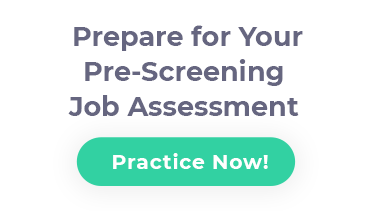Standard Chartered Bank Assessment Test, Hiring Process & Interviews Online Preparation [2025]

What Is Standard Chartered?
Standard Chartered is a banking and financial services multinational company with over one-hundred and sixty years of experience in the financial industry. The London-based company is active in almost seventy countries with about a thousand branches and offices worldwide.
Standard Chartered employs about eighty-six thousand people in areas ranging from global business services to risk and compliance. They are involved in more than sixty markets consulting and offering services on varying levels from private to retail to corporate. Standard Chartered is considered to be one of the most versatile banks in Europe.
What Is Standard Chartered’s Hiring Process?
Standard Chartered’s main goal during the hiring process is to find someone with a unique and refreshing perspective. At their heart, Standard Chartered is a company that values an original point of view and the ability to step into someone else’s shoes. Their hiring process is a reflection of this goal as they utilize both personality and aptitude tests to find the best possible candidate for the job. Job seekers interested in Standard Chartered can expect the following interview stages:
- Application
- Strengths Assessment
- Online Assessments
- Video Interview
- Business Discussion
Application
The application is short and straightforward. The form will ask the basics like work experience and education. Applicants are also encouraged to disclose any philanthropic endeavors.
Accompanying the application form will be a role description. Keep this information in mind because Standard Chartered inquires about these details later on in the interview process.
Strengths Personality Assessment
The strengths assessment is sent to the candidate via email after they have submitted their application. It is a personality-test that, like the name states, evaluates strengths. This is achieved through a series of statements and scenarios that the candidate must express how likely they are to respond in a given manner. The answer choices range from least likely to most likely. There are usually about twenty statements.
The strengths assessment is used to see how well a candidate fits in with the expectations of the job and the company. Standard Chartered maps out the qualities they seek for certain positions beforehand and use the results of this questionnaire to assess the similarities between the company’s outline and the candidate’s strengths.
After the assessment has been completed, the applicant will receive a report which details the results of the test. This report is identical to the one Standard Chartered receives. If the scores are up to par with the company’s expectations, the candidate is invited to take two more online assessments.
Standard Chartered Online Assessments
Standard Chartered uses two aptitude assessments to assess their candidates. These tests are sent in a link and asked to be completed within three to five days.
Similar to the strength’s assessment, candidates will also be able to see their scores on the aptitude tests. The report may also include areas to work on and a few suggestions. The results of the assessments inform Standard Chartered of the candidate’s proficiency with numbers, novel information, and ambiguous data among other things.
Applicants should expect the following online assessments:
- Abstract Reasoning
The abstract reasoning test is a fifteen-minute, non-verbal assessment. This means that the test uses shapes instead of numbers or words. The shapes come in three by three matrices with one missing element. The objective of the test is for the candidate to use their logical thinking skills to identify a pattern in the sequence. These patterns can be depicted by changes in color, shape, position, or frequency. Test takers are provided multiple answer choices and seventy-five seconds to answer the question. The abstract reasoning test is adaptive, so each question gets increasingly difficult as the candidate progresses through the assessment.
- Numerical Reasoning
The numerical reasoning exam concerns the candidate’s ability to interpret graphs, tables, and other types of data. Understanding statistics, percentages, fractions, ratios, and the like is important for success on this test. The questions typically ask about trends in the data and a variety of specifics that require a solid foundation of math skills. The test is structured around a figure—the graph or table—followed by three multiple-choice questions. Candidates have ninety-seconds to answer each question, and they have sixteen minutes in total to complete the assessment. The numerical reasoning test is adaptive as well.
Video Interview
The video interview is the third stage of Standard Chartered’s interview process. An invitation is sent to candidates if the company finds their scores on the online assessments up to par. The majority of the questions are competency-based. These questions ask about past behavior to try and predict future performance.
The interview itself will contain nine total questions. Candidates’ are given thirty seconds to read and think of an answer to a question. Then, they are provided ninety seconds to discuss their answers. Below are common questions asked during this stage:
- Describe a big mistake you made and the lessons you learned from it.
- How are your strengths an asset to Standard Chartered?
- Why are you interested in Standard Chartered? Why this position?
- What makes you the best candidate for this job?
- How do you think customer satisfaction is achieved?
- When you work in teams what role do you typically assume?
Business Discussion (Assessment Day)
The business discussion is the candidate’s final chance to make a good impression on Standard Chartered. Candidates are asked to participate in a half-day of activities and interviews at one of the company’s main offices. These activities include a group exercise and role-play exercise as well as two interviews with a manager and a senior member of the Standard Chartered team.
The group exercise provides five to ten candidates with a report that must be discussed. Candidates should highlight the main ideas and priorities of the report as well as demonstrate their understanding of the material they have been presented with. Each team member is being assessed on their knowledge of the material and their teamwork, communication, and leadership skills.
The role-play exercise resembles the day-to-day activities one might encounter on the job. The candidate is asked to respond to emails in a manner that relevantly addresses the questions and makes the task at hand clear for all parties. This exercise comes with a report detailing the information necessary to complete the task. Candidates are usually given an hour to finish the case study.
One of the interviews is a panel interview. Here, the candidate must partake in a presentation of sorts of information given to them in a report. This interview is similar to a case study. Candidates must emphasize the key points of the report and demonstrate an understanding of the material by suggesting a course of action.
Finally, the one-on-one interview. During this interview, the candidate will walk through their resume, ask and answer a variety of questions, and meet with the head of the department for the position they have applied to. The questions for this interview are generally competency-based with a few job-specific inquires. The interviewer will also review the candidate’s performance during the assessment day and ask questions about the background of the company and the responsibilities of the role.
How to Prepare for the Standard Chartered Online Assessments?
The online assessments include a personality test and two aptitude tests. The results of these tests provide the company with valuable and objective insight into the behavior and intelligence of each candidate. Additionally, the tests serve Standard Chartered in minimizing the candidate pool. This raises the stakes of these tests significantly.
Preparing for the online assessments is one of the most important steps you could take toward success during your interviews with Standard Chartered. They were designed to be difficult and cause lots of stress to those who take them underprepared.
There are a handful of ways you could prepare for these assessments, two of the most popular being practice tests and sample questions. Using practice tests for the aptitude tests is recommended because these tend to be more difficult than the personality questionnaire.
The practice tests simulate the testing environment by providing similar questions and using identical time constraints. This allows you to navigate the test and get a feel for it before your actual tests with the company. Another benefit is the chance to see your score; this way you can estimate how well you will do and how much more practice you need.
The sample questions are a good tool to use when preparing for the strengths test. First, you should try to get an idea of the strengths Standard Chartered is looking for in the particular role you are applying for—these should be listed in the role description. Then, try to align your answers to the sample questions to the traits that the company favors. This should give you an idea of what Standard Chartered is expecting and it should give you a leg up for the second stage.
Interview Tips for Standard Chartered
Standard Chartered is a value-oriented company. That being said, it would be beneficial to review their company values before your interviews. Have some examples prepared that demonstrate your ability to embody these traits. Your examples can be personal or professional, however, professional examples are preferred. Below are Standard Chartered’s company values:
- Better Together
- Do the Right Thing
- Never Settler
An example of a question the company might ask that give you the chance to display your connection to these qualities might be “Name a time you and a coworker disagreed. How did you handle it?” Your answer could illustrate your desire to resolve disagreements in a fair and collaborative manner. A good example would portray strong communication and teamwork skills that enhance your ability to create a positive work environment.
Use these tips as a guide toward a successful interview—or interviews—with Standard Chartered. And remember to always put your best foot forward. Best of luck!

